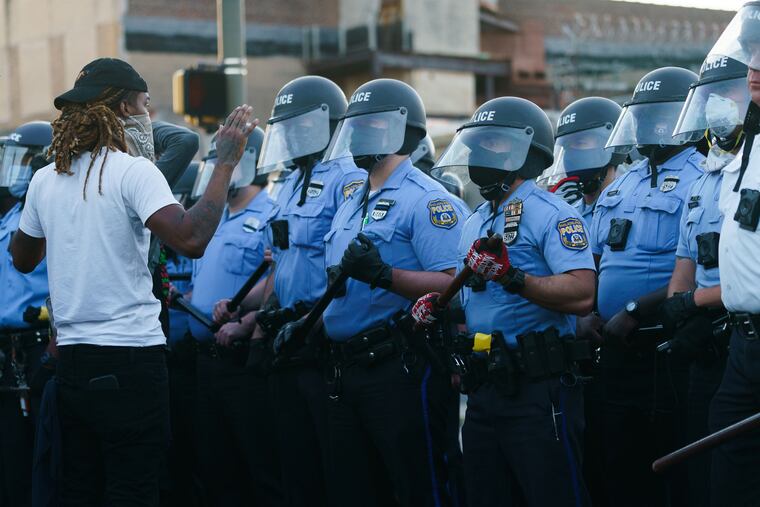Philly police contract does not fulfill the promise that Black Lives Matter | Editorial
Police union President John McNesby and Mayor Jim Kenney lauded the contract as a fair compromise for both sides, but it falls far short of what Philadelphians expect.

On Tuesday, Philadelphia and the Fraternal Order of Police, the city’s police union, reached an agreement on a new three-year contract. The pact, which includes bonuses, raises, and minor modifications to the disciplinary process for officers, was drafted by a three-person arbitration panel composed of people whom Philadelphians have never voted for nor heard from.
Both local union president John McNesby and Mayor Jim Kenney lauded the contract as a fair compromise for both sides, but its provisions for officer discipline fall far short of what Philadelphians expect in terms of accountability for police officers — particularly after months of marches, demands, local legislation, and promises from elected officials. Not only that, but the entire negotiation process represents a troubling lack of transparency.
» READ MORE: New police contract promises raises, changes for city's police.
That’s largely because of a state law called Act 111. Police officers, like firefighters, are legally prevented from going on strike in Pennsylvania, so Act 111 lays out the process for securing collectively bargained contracts for officers through binding arbitration. What’s noteworthy about Act 111 is how it creates a negotiation process for the police that differs sharply from the process that exists for the negotiation of other municipal union contracts — and places power at the hands of arbiters who aren’t accountable to the public.
In negotiations with any other union for city employees — besides firefighters, who are also covered by Act 111 — workers can leverage the threat of a strike in contract talks. Because the police can’t strike, a panel of three arbitrators — one selected by each side plus a neutral one — is handed the authority to resolve any disputes between the parties, which essentially means that the arbitrators write the contract.
Even when the city’s teachers were prevented from striking during the School Reform Commission era, they were not covered by Act 111 and did not benefit from this kind of special negotiation process and ended up going nearly a decade without a contract
So when it comes to how we pay our police officers, there’s virtually no other recourse than the opaque process that just unfolded. And the budget impact of the new contract is not insignificant: between the $1,500 one-time bonus for every officer (in a rank of 6,000) and raises of 2.75% this year and of 3.5% in 2022 and 2023, the police budget will go up by $133 million over the next three years.
Even though the contract that covers the city’s officers is negotiated by union officials, not police administrators, it is difficult to avoid viewing this agreement through the lens of the department’s performance. At a time of unprecedented gun violence, the efforts of the city’s officers have failed to produce the kind of results that Philadelphians need. According to an analysis of police statistics by the District Attorney’s Office, in August there were 22 homicides; police detectives made arrests in three of those cases during that month. During that same period, the police made arrests in 13 of the 156 nonfatal shootings, 10 out of 149 commercial burglaries, and 210 out of 5,268 property crimes.
In the past, the confidential nature of contract talks allowed cities to temper demands for increased wages by ensuring strong protections against termination and discipline. But trade-offs like police accountability vs. spending are a false dilemma — and even if they are seemingly unavoidable in the heat of negotiations, they deserve public scrutiny instead of being baked into a contract by negotiators in a closed room.
» READ MORE: The juxtaposition of a police brutality settlement and the new police contract says it all | Helen Ubiñas
Following the news of the new contract, Councilmember Isaiah Thomas, who has been leading critical police reform initiatives such as the Driving Equity Bill, has called for abolishing Act 111. Instead, to ensure that police officers have basic worker protections, Act 111 needs extensive revisions that add more sunlight to the process and allow for greater accountability both over contract terms, in general, and disciplinary decisions, in particular. This board has in the past supported the efforts of State Rep. Donna Bullock to overhaul the act in a way that is fair to officers and to the public.
Since their decision to authorize the use of tear gas on protesters along I-676 and communities in West Philadelphia, city officials have said repeatedly that Black Lives Matter. Thanks to Act 111 and an inability to secure stronger changes to the disciplinary process, this contract fails to fulfill that promise.